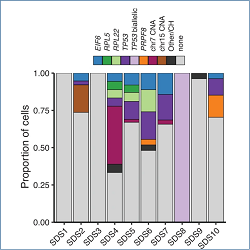
Shwachman-Diamond syndrome (SDS) is an inherited condition caused by faulty ribosomal assembly. Individuals with SDS are at high risk of progression to blood cancers including myelodysplasia and acute myeloid leukaemia, but the underlying mechanisms have remained unclear. New research from CIMR’s Warren lab, co-led with Dr Jyoti Nangalia (Wellcome Sanger Institute & Cambridge Stem Cell Institute) and Prof. David Kent (University of York) in collaboration with several other groups has used whole genome sequencing to track the life histories of individual blood stem cells. Publishing in Nature Communications, Drs Heather Machado, Nina Øbro, Nicholas Williams, Shengjiang Tan and colleagues showed that the strong selective pressure to overcome impaired ribosome synthesis results in convergent somatic mutations in a unique set of target genes from early in life, even in utero. Although the mutations offset the deleterious effect of germline ribosomopathy, paradoxically they result in a collapse of clonal diversity within the blood system and increase the opportunity for TP53-mutated cancer evolution.

